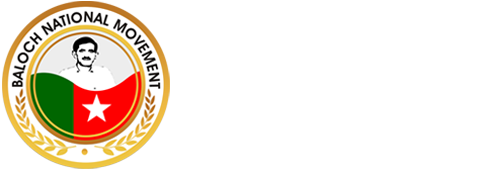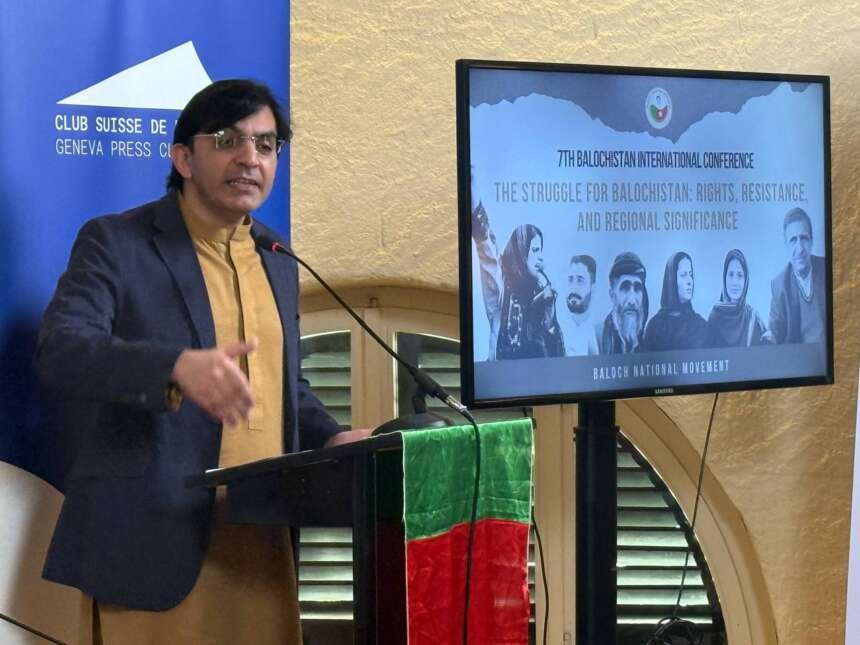Mohsin Dawar said that the survival of the Baloch, Pashtuns, Sindhis, and other oppressed nations is not possible within Pakistan’s existing constitutional and federating structure.
“The constitution gives disproportionate power to one province, enabling Punjab’s dominance while sidelining the rest. This flawed structure cannot safeguard our basic human rights,” he stated.
Mohsin Dawar, Member of Pakistan’s Parliament and President of the National Democratic Movement (NDM), expressed these views while addressing the 7th Balochistan International Conference in Geneva, organised by the Baloch National Movement (BNM).
The conference, which covered Balochistan’s issues, struggles, and political, human, and economic rights, was attended by participants from diverse walks of life who expressed solidarity with the Baloch movement.
Speaking on enforced disappearances in Balochistan, Dawar said:
“Today, as we gather here, Baloch mothers and sisters have been protesting in Pakistan for the past 62 days. I have personally visited them, along with my party leadership, and I know the courage and resilience they have shown despite continuous repression. Sadly, I have hardly seen any leaders from the mainstream, Punjab-dominated political parties standing with them.”
This silence exposes the reality of Pakistan and the attitude of its ruling political parties toward oppressed ethnicities — Baloch, Pashtuns, and Sindhis. Time and again, these parties show solidarity with victims when they are out of power, but once they assume office, their priorities shift. Their main objective remains power, not justice or human rights.”
He added that for 62 days, families of missing persons have been sitting in Islamabad, initially denied even the right to pitch a protest tent. “Yet they continue their peaceful struggle. I salute their courage. From this stage, I demand the release of the leadership of the Baloch Yakjehti Committee and all political prisoners unjustly detained. Their arrests and repeated charges under fabricated cases are nothing more than attempts to silence them.”
Criticising Pakistan’s judiciary, Dawar remarked:
“Today, in Pakistan, the judiciary has been reduced to an arm of the executive. The 26th Amendment has further eroded its independence, making it a tool to oppress already marginalised nations. Instead of protecting rights, it facilitates repression. We have seen this in the treatment of Baloch leaders like Dr. Mahrang Baloch and many others who face fabricated charges and repeated detentions.”
The issue of missing persons is one of the darkest realities in Pakistan. Between January and June this year alone, 725 cases of enforced disappearances were reported. If a targeted person cannot be found, often a relative is taken instead — collective punishment that criminalises entire families. Today, Baloch identity itself has been turned into a crime. Students are abducted from universities in Punjab and elsewhere simply because they are Baloch. To be Baloch is to be a suspect.”
He continued that this policy of criminalisation and violence is not confined to Balochistan.
“In Pashtun areas too, we have seen the same pattern — extrajudicial killings, enforced disappearances, and death squads targeting political workers. The state has used religious militancy and the Taliban to suppress Pashtun nationalism, just as it seeks to crush Baloch identity. The aim is the same: to deny oppressed nations their rights and erase their voices.”
Dawar stressed:
“The only way forward is to demand a fundamental change in the federating structure of Pakistan. Anything less will not protect our rights. For this, we need alliances — Sindhi, Pashtun, Baloch, and others — working together to create pressure and negotiate with the state on equal terms. We cannot rely on mainstream political parties, who use our issues only as bargaining chips in their deals with the establishment.”
Concluding, he said:
“Yes, Pakistan’s rulers may continue to govern by force for some years, but our nations have lived on this land for thousands of years. We are its rightful owners. Regimes will come and go, but sooner or later, we will reclaim our ownership, dignity, and rights.”


